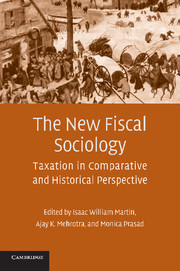Book contents
- Frontmatter
- Contents
- List of Contributors
- Acknowledgments
- Foreword
- 1 The Thunder of History: The Origins and Development of the New Fiscal Sociology
- PART ONE SOCIAL SOURCES OF TAXATION: AMERICAN TAX POLICY IN COMPARATIVE PERSPECTIVE
- PART TWO TAXPAYER CONSENT
- PART THREE THE SOCIAL CONSEQUENCES OF TAXATION
- References
- Index
Foreword
Published online by Cambridge University Press: 13 January 2010
- Frontmatter
- Contents
- List of Contributors
- Acknowledgments
- Foreword
- 1 The Thunder of History: The Origins and Development of the New Fiscal Sociology
- PART ONE SOCIAL SOURCES OF TAXATION: AMERICAN TAX POLICY IN COMPARATIVE PERSPECTIVE
- PART TWO TAXPAYER CONSENT
- PART THREE THE SOCIAL CONSEQUENCES OF TAXATION
- References
- Index
Summary
John Locke philosophized in the midst of political action. From 1683 to 1690, he spent the last years of the Stuart monarchy in continental exile. Charles II died in 1685, opening Britain's royal succession to a Catholic, James II. But resistance from a largely Protestant Parliament, backed by London financiers and a generally anti-Catholic English population, brought on a succession crisis. In 1688, invited by English magnates, William of Orange (husband of Mary, James's Protestant daughter, and chief executive of the Netherlands) invaded the British Isles. The ensuing civil war continued until 1691. In retrospect, people called the transfer of power to William and Mary the Glorious Revolution. In 1690, Locke accompanied Queen Mary on the ship that brought her from Holland back to England. He brought with him a manuscript, composed in exile, destined to be a founding document of the new regime: his Treatise of Civil Government.
Locke stated a contract theory of government with exceptional clarity and force. Government, he declared, rested ultimately on property and on consent of the governed. A viable vision of relations between rulers and ruled required a legislature – read Parliament – that spoke for the people, or at least for propertied men. The executive – read the Crown – enjoyed some autonomy, but ultimately remained subordinate to the legislature. Yet the supply of funds to support the executive's action posed a problem.
- Type
- Chapter
- Information
- The New Fiscal SociologyTaxation in Comparative and Historical Perspective, pp. xi - xivPublisher: Cambridge University PressPrint publication year: 2009
- 6
- Cited by



